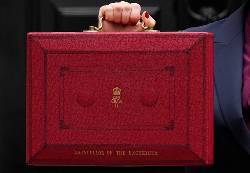LONDON (AP) — Following weeks of speculation and mixed signals, Britain's center-left government will deliver a budget Wednesday aimed at pleasing financial markets, businesses and jaded voters — an all-but-impossible task for an already unpopular administration.
In her second annual budget since the Labour Party returned to power after 14 years with a landslide election victory in July 2024, Treasury chief Rachel Reeves is set to tell lawmakers that more tax-raising measures are necessary to plug a hole in the public finances.
In a video statement, Reeves said she would “take the fair and necessary choices” to ease the cost of living, safeguard public services and keep debt under control.
“And I will push ahead with the biggest drive for growth in a generation," she said.
Tax hikes likely
Reeves, the first woman to hold the post of chancellor of the exchequer, said much the same at her first budget a little more than a year ago. She insisted at the time it would be the one and only big tax-raising budget in this parliamentary term, which is due to run to 2029.
Unfortunately for Reeves, the British economy, the world's sixth-largest, is not doing as well as she hoped, with many critics blaming her decision last year to slap taxes on business. Though there were signs that the economy was on the mend in the first half the year, when it was the fastest-growing among the Group of Seven leading industrial nations, it has faltered again.
“The chancellor faces a delicate balancing act of conveying fiscal stability while advancing the growth agenda,” said Peter Arnold, chief economist at consulting firm EY U.K.
False dawns have been a regular feature of the British economy since the global financial crisis of 2008-9. If the economy had kept growing at precrisis levels, it would be nearly a quarter bigger than it is now. That's a lot of lost activity — and a lot of lost tax revenue going into the Treasury's coffers.
In addition to the long-term costs of the financial crisis, Britain’s public finances, like those of other nations, have been further squeezed by the costs of the COVID-19 pandemic, the Russia-Ukraine war and U.S. President Donald Trump’s global tariffs. The U.K. bears the extra burden of Brexit, which has knocked billions off the economy since the country left the European Union in 2020.
Meanwhile, Reeves has a bunch of spending commitments aimed at easing the cost of living as inflation remains stubbornly high, including making up for a series of about-turns on planned welfare cuts and the likely ditching of a cap on benefits paid out to families with several children. That and measures such as freezing rail fares or cutting green taxes on energy bills don't come cheap.
All in all, economists think that she will have to find something like 20-30 billion pounds ($26-39 billion). After flirting with the idea of hiking income tax rates — which would break a key Labour election promise — Reeves now looks likely to raise money from smaller, and more fiddly, taxes.
The main measure anticipated is a further freeze in the levels at which earners pay Britain's different tax levels, meaning as wages rise more people fall into higher tax brackets. Other potential changes include a mansion tax on high-valued properties, changes to the capital tax regime and a cut to tax-free provisions for private pensions.
High political stakes
The budget is a high-stakes moment for Reeves and Prime Minister Keir Starmer, who is facing mounting concern from Labour lawmakers over his dire poll ratings. Opinion polls consistently put Labour well behind the hard-right Reform UK party led by Nigel Farage.
The next election does not have to be held until 2029, and the government continues to hope that its economic measures will spur higher growth and ease financial pressures.
But speculation is swirling about a potential challenge to Starmer's leadership from within his party, and analysts say a misfiring budget could add to the sense of crisis within the government.
...


